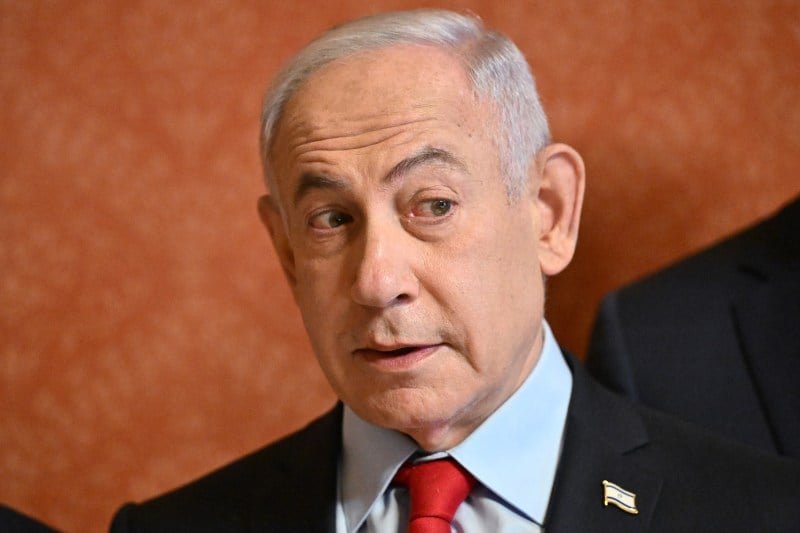Netanyahu Remains Unpopular at Home—This Is How He Could Win a Coming Election

Netanyahu Remains Unpopular at Home—This Is How He Could Win a Coming Election
His party is pushing a bill that would suppress turnout among Arab-Israeli voters.
Israeli Prime Minister Benjamin Netanyahu looks on before a meeting with U.S. Senate Majority Leader John Thune, Republican from South Dakota, and other senators at the U.S. Capitol in Washington, D.C., on Feb. 6. Mandel NGAN / AFP
The Gaza cease-fire that took effect on Jan. 19 brought Israeli domestic politics back to the fore—and helped remind people just how vulnerable Prime Minister Benjamin Netanyahu is politically. Within 48 hours, his far-right coalition partner Otzma Yehudit quit the government over the pause in fighting, and Israel’s military chief resigned over the Oct. 7, 2023, failures. Elections aren’t due until the fall of 2026—and President Donald Trump’s strange remarks this week about the United States taking ownership over Gaza seem to have given Netanyahu a boost for now. But a coalition crisis over any number of issues could well topple his government—forcing him into a long-shot reelection campaign.
Mindful of this, Netanyahu has been working on a path to securing victory. His coalition is advancing legislation that could fundamentally reshape Israel’s electoral landscape by making it easier to disqualify Arab candidates from parliament—a move that could maintain his bloc’s power despite its declining popularity.
The Gaza cease-fire that took effect on Jan. 19 brought Israeli domestic politics back to the fore—and helped remind people just how vulnerable Prime Minister Benjamin Netanyahu is politically. Within 48 hours, his far-right coalition partner Otzma Yehudit quit the government over the pause in fighting, and Israel’s military chief resigned over the Oct. 7, 2023, failures. Elections aren’t due until the fall of 2026—and President Donald Trump’s strange remarks this week about the United States taking ownership over Gaza seem to have given Netanyahu a boost for now. But a coalition crisis over any number of issues could well topple his government—forcing him into a long-shot reelection campaign.
Mindful of this, Netanyahu has been working on a path to securing victory. His coalition is advancing legislation that could fundamentally reshape Israel’s electoral landscape by making it easier to disqualify Arab candidates from parliament—a move that could maintain his bloc’s power despite its declining popularity.
Netanyahu, who has led Israel longer than any other prime minister, faces a perfect political storm: plummeting approval ratings since the Oct. 7 attacks, a corruption trial entering a critical phase, and lingering public anger over his attempted judicial overhaul in 2023. All the polling conducted by mainstream news organizations since October 2023 suggests Netanyahu and his coalition would lose the next election. Even the deeply pro-Netanyahu Channel 14 has him down in most surveys. Yet his current coalition—the most right-wing in Israel’s history—still holds both the parliamentary power and political motivation to change the rules before the next round of voting.
The proposed amendment to one of Israel’s quasi-constitutional laws would make it dramatically easier to disqualify candidates running for Israel’s parliament while limiting judicial oversight of the disqualification process. If passed, it could effectively suppress Arab political representation and even trigger an Arab voter boycott. The amendment passed a preliminary Knesset vote in October 2024 with the government’s backing and is now being prepared for full legislation in a parliamentary committee headed by Likud member Ofir Katz, who also initiated the bill.
Demographics and voting patterns have turned Arab citizens of Israel into a crucial electoral force. They comprise roughly 20 percent of Israel’s citizens—approximately 2 million people. This figure excludes Palestinians in the occupied West Bank who live under Israeli military rule but cannot vote in national elections. East Jerusalem Palestinians, for their part, can only participate in municipal votes.
In recent decades, Arab voters have demonstrated their potential electoral power. In 2015, when Arab parties united in the Joint List, they secured 13 seats in the 120-member Knesset and then 15 seats in 2020. In four consecutive elections between 2019 and 2021, high Arab turnout helped deny Netanyahu and his partners a majority. Even more significantly, in 2021, the Islamist Ra’am party crossed a historic threshold by joining the Naftali Bennett-Yair Lapid governing coalition—proving that Arab parties could be kingmakers. Netanyahu’s bloc responded by branding Ra’am and other Arab lawmakers as “supporters of terrorism”—a label it applied even to Ra’am’s leader, Mansour Abbas, who consistently condemned attacks on Israelis.
Yet Arab political power remains vulnerable. Voter turnout in Arab communities traditionally lags behind the Jewish sector, and recent years have seen growing fragmentation among Arab parties. With Israel’s center-left opposition weakening, it needs Arab voters to show up in large numbers at the voting booth if it hopes to deny Netanyahu a majority in parliament. The proposed legislation, by potentially triggering an Arab voter boycott or disqualifying key candidates, could make the path back to power much easier for Netanyahu.
Efforts to disqualify political parties and candidates have been a recurring feature of Israeli elections, particularly targeting Arab representation. Since 2003, the Central Elections Committee has attempted to ban Arab parties or individuals in nearly every election cycle, primarily using two legal arguments: that these parties support armed struggle against Israel or that they reject Israel’s national character as a Jewish and democratic state. A third ground—incitement to racism—has been used mainly against Jewish far-right candidates, leading to the disqualification of several Kahanist politicians.
But the Israeli Supreme Court has mostly rejected attempts to disqualify Arab-led parties. Most recently, in 2022, it unanimously overturned the election committee’s decision to bar the Balad party from running, as well as individual Arab-Israeli Knesset members, citing insufficient evidence. In these decisions, justices tend to set a high bar for banning a party that represents a political minority.
The proposed amendment would fundamentally alter this dynamic. While the Central Elections Committee—controlled by the parliamentary majority—can disqualify candidates under the current rules, the Supreme Court examines all evidence independently when reviewing these decisions. The new law would relegate the court to an appeals instance, mostly able to review procedural legality rather than to reassess evidence. This change would make it significantly harder for the court to overturn political disqualifications.
Moreover, the amendment broadens the definition of “support for terrorism” to include even individual statements that could be interpreted this way, rather than requiring evidence of systematic support for armed struggle. It would also allow the committee to disqualify individual parties within joint electoral lists—a provision clearly aimed at breaking up Arab political alliances.
While “support for terrorism” sounds like a clear-cut legal standard, in Israeli political discourse it has become a blanket term used to delegitimize Arab political expression. Recently, Joint List leader Ayman Odeh was accused of supporting terrorism for a tweet celebrating a hostage release deal that also freed Palestinian prisoners; several Knesset members (MKs) have initiated a move to have Odeh expelled from parliament. Even opposition leader Yair Lapid, whose own coalition once relied on Arab political support, called for Odeh’s removal from the Knesset.
Israeli legal scholars and institutions have warned against the proposed amendment. An opinion by The Israel Democracy Institute notes: “Evidence showing activity to protect basic human rights of political prisoners within prisons will lead to disqualification of Arab candidates; and evidence documenting participation of Knesset members in ceremonies welcoming prisoners after their release will also be seen as included in this cause.” The opinion concluded that these types of activities were in no way “acts of terrorism,” and yet could serve as pretexts for outlawing political parties.
The Institute argues that the law specifically targets Israel’s Arab minority, which “even before this proposed amendment suffers from systematic suppression of their freedom of expression and protest.” By allowing disqualification based on a single statement rather than requiring evidence of systematic support for armed struggle, and by weakening judicial oversight, the amendment appears to have nothing to do with national security and everything to do with national politics.
Beyond electoral calculations, the proposed amendment reflects a deeper constitutional crisis in Israeli democracy. While Israel defines itself as both Jewish and democratic, one in four citizens in its political collective is non-Jewish. True democracy requires affording these citizens a meaningful voice in shaping policy and even constitutional laws. Yet under Netanyahu, and driven by his determination to maintain power at any cost, Israel has seen an unprecedented legitimization of Kahanism—a far-right ideology that seeks to ban Indigenous non-Jews from the political collective and ultimately deport them from the land. In the immediate term, this ideology is manifested in conditioning Arab citizens’ rights on loyalty tests or military service—where they might be expected to square off against fellow Palestinians.
Implicit in this conception of Israeli citizenship is the idea that fundamental political decisions like territorial withdrawals or constitutional amendments should require not just a majority in order to be seen as legitimate but a Jewish majority. The proposed legislation falls into this trend, making it much more consequential than the fight over Netanyahu’s political fate.
Perhaps most telling is how centrist parties, including Lapid’s faction, have been drawn into this idea of suppressing Arab political representation—against their own strategic interests. For the center-left to ever govern again in Israel, it would need the support of a robust Arab contingent in parliament. Yet even some centrist Israelis don’t like the idea of Arab-led parties taking part in the government. This dynamic highlights a fundamental weakness in Israeli democracy: the unresolved tension between its promoted Jewish exclusivity and its aspiration to maintain substantive democratic principles.
Under the guise of bureaucratic procedure and security concerns, the proposed election law would further formalize this contradiction, transforming Israel’s treatment of its Arab minority from de facto discrimination to de jure exclusion from political power.
Noam Sheizaf is a Tel-Aviv based journalist and researcher. His latest documentary, H2: The Occupation Lab, chronicles the history of Hebron as a microcosms of the Israeli-Palestinian conflict.
More from Foreign Policy
-

Russian President Vladimir Putin looks on during a press conference after meeting with French President in Moscow, on February 7, 2022. The Domino Theory Is Coming for Putin
A series of setbacks for Russia is only gaining momentum.
-

The container ship Gunde Maersk sits docked at the Port of Oakland on June 24, 2024 in Oakland, California. How Denmark Can Hit Back Against Trump on Greenland
The White House is threatening a close ally with a trade war or worse—but Copenhagen has leverage that could inflict instant pain on the U.S. economy.
-

Donald Trump speaks during an event commemorating the 400th Anniversary of the First Representative Legislative Assembly in Jamestown, Virginia on July 30, 2019. This Could Be ‘Peak Trump’
His return to power has been impressive—but the hard work is about to begin.
-

US Secretary of State Marco Rubio greets employees at the State Department in Washington, DC, on January 21, 2025. The National Security Establishment Needs Working-Class Americans
President Trump has an opportunity to unleash underutilized talent in tackling dangers at home and abroad.











Join the Conversation
Commenting on this and other recent articles is just one benefit of a Foreign Policy subscription.
Already a subscriber?
.
Subscribe
Subscribe
View Comments
Join the Conversation
Join the conversation on this and other recent Foreign Policy articles when you subscribe now.
Subscribe
Subscribe
Not your account?
View Comments
Join the Conversation
Please follow our comment guidelines, stay on topic, and be civil, courteous, and respectful of others’ beliefs.
Change your username |
Log out
Change your username:
CANCEL
Confirm your username to get started.
The default username below has been generated using the first name and last initial on your FP subscriber account. Usernames may be updated at any time and must not contain inappropriate or offensive language.